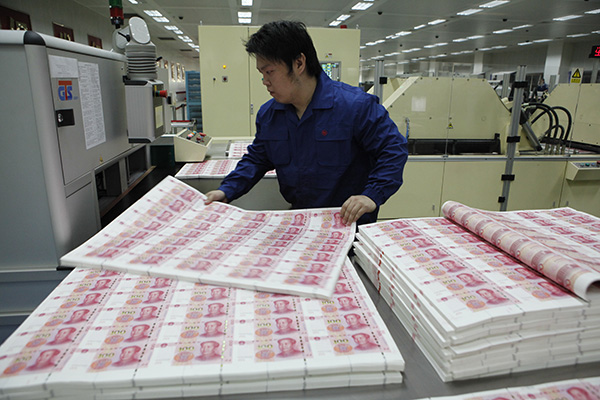 |
|
A worker prepares to cut 100 yuan bank notes printed on large sheets into separate bills at the Beijing Banknote Printing Co on Oct 29, 2015. [Photo/China Daily] |
The workers process 50 and 100 yuan notes separately, because those that can still be used must be separated from the remainder. "In addition to checking if the notes are new enough to be put back into circulation, we also have to check to ensure that their anti-counterfeiting features still work. If that's not the case, we destroy them, even if they look new," Dou Nan, deputy director of the center, said.
Hu Shasha, who supervises the processing of higher-denomination bills, said the workers never think about the financial value. "We don't see the notes as money, and we cannot see them as money. They are just goods to be checked," he said.
Each inspection team consists of two skilled workers and an industrial-grade note-counting machine. Red labels are placed on bills that can still be used, while black labels are used for rejects. "We cannot tell our friends or even family members exactly what we do. It's a very sensitive job," the 28-year-old said.
Before taking a strip of paper containing a bundle of 10 yuan bills to be checked and counted, staff member Li Li hit the edge of her desk with it, immediately sending out a cloud of dust that spread across the room. She can go through about 500,000 yuan ($78,500) worth of 10 yuan notes during the morning shift.
The processing plant is rank with the stench of old and dirty bills which, having passed through numerous hands, are likely to harbor bacteria, so a ventilation and sterilizing system has been installed to safeguard the employees' health.
Once the counting and evaluation processes are complete, the notes lose their face values and become waste material, measured only by weight.
The 10 yuan notes Li had counted were put back in their bags and taken to a shredding machine where they were reduced to slivers so fine that they could never be reassembled. In the eyes of the workers who toss the bills into the machine, the notes are little more than waste paper.
The machine compresses the debris into blocks or cylinders to ensure easy transportation. The center, which is responsible for the destruction of all the old and damaged bank notes in Jiangsu, can process 7 to 8 tons per day.
Biomass boost
In March last year, the center teamed up with the Guoxin biomass power plant in Yancheng city, 270 km northeast of Nanjing, to ascertain if bank note waste could be used to generate electricity.
"The level of air pollutants emitted by burning bank note waste is lower than the national standard, and test results also show that the bills are a good material for use in electricity generation," said Zhu Hongwei, the fuel engineer at the power plant.
